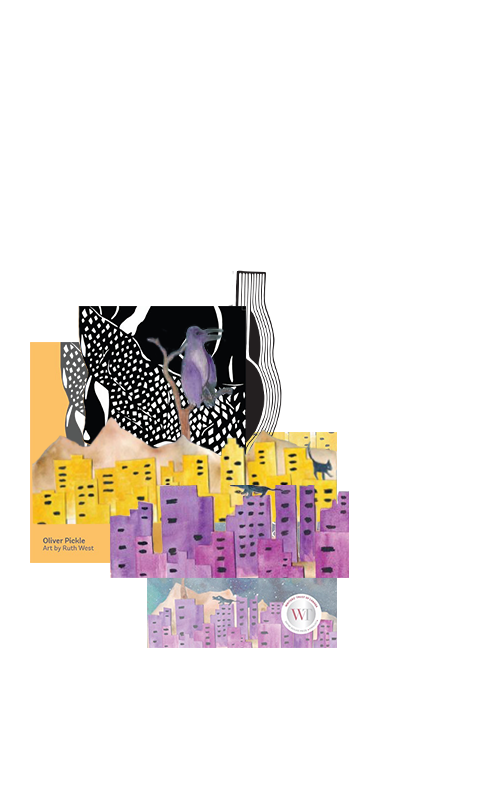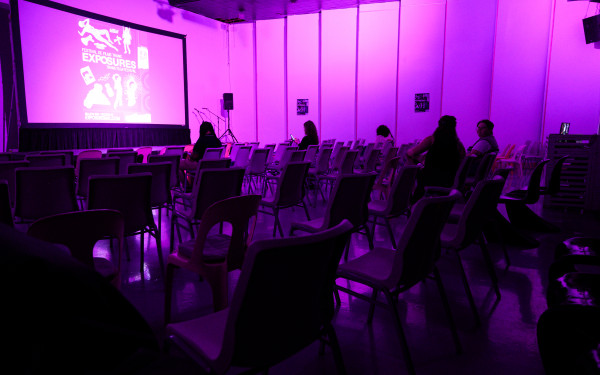Putting Queer and Trans Narratives at the Forefront at Metonymy Press
Lean About the Independent Montreal Publisher Metonymy Press
“Little Blue Encyclopedia (For Vivian), in a nutshell, is about a queer trans woman’s unrequited love for her straight trans friend who died,” said author Hazel Jane Plante about Metonymy Press’ next release.
“It really focuses on art, friendship, grief, love, and queerness,” she continued.
While searching for a publisher, Plante fixed her eyes on the Montreal-based Metonymy Press. “One of the things that I knew I wanted to be able to do with Metonymy [Press] was to make my book better,” she said. “That could be a really hard process, but I have to say that Ashley [Fortier] and Oliver [Fugler] have so far made that a really enjoyable, meaningful and useful process.”
Fugler and Fortier established Metonymy Press in the summer 2014, striving to fill a need they noticed in the queer English-speaking community here. “We were familiar with the fact that there wasn’t a lot of queer English language literature in Montreal,” said Fugler, “so actually choosing to create some ourselves within the city was the impetus.”
The pair comes from a collective organizing background, in which there’s a big tradition of “doing it yourself.” Creating Metonymy Press was “an evolution of our role within the queer communities,” Fortier added, and it allowed them to give back and share skills.
In the spirit of DIY-ing, the co-founders carry out the entire enterprise themselves. Their jobs consist of editing manuscripts and bringing books into the world, but their time is also filled with administrative tasks. Fortier and Fugler have been doing the marketing, accounting, and shipping themselves since the press’ inception.
“[I have] slowly figured out how to do layout in a book, build websites, and [how to] teach yourself accounting,” said Fortier. “I learned how to ask for help […] and trust that people are more often than not excited about what we’re doing and want to share their knowledge.”
Metonymy Press doesn’t operate like any old publisher. Fugler explained it was unusual in the industry to be a publisher without a distributor, but it worked for them.
“I think it’s also interesting to whatever extent we have the capacity [to] interrupt the more mainstream environments that don’t necessarily get challenged […] or don’t necessarily make space for the types of authors that we have,” said Fortier.
The two high school friends nurtured the idea for the publishing company since the early 2010s, taking courses through the editing and publishing program at Ryerson University. Their involvement in the Queer Between the Covers book fair made it apparent there’s a lack of space for queer and trans writers. They were struck by the lack of visibility which led them to realize just how vital the press would be.
In 2014, they received a grant from the provincial government, and the project began to take shape. The next year, Metonymy Press was up and running, and published its first book She Is Sitting in the Night: Re-Visioning Thea’s Tarot. it was written by Fugler, who uses the pen name Oliver Pickle.
“That’s where we started,” said Fortier about the book that broke the ice. “We always had a plan to be a primarily fiction, and creative non-fiction press […] it is in our mandate of putting queer cultural production into the world.”
While based in Montreal, Metonymy Press is a Canada-wide enterprise. The co-founders are from Ottawa, where they initially met, but they say they’re really rooted in the city where they launched their business.
“It is a particular context, publishing in English in Montreal,” said Fortier. “But we did, because this is where our context was and where our communities were based. We noticed a need, and felt like it made sense.”
Plante, their latest author, lives and works as an academic librarian in British Columbia. “I was really honoured and surprised that I was the first person whose work they offered to publish who they haven’t met in person before,” said Plante. Metonymy Press and the debuting novelist met over Skype, but they mostly communicate by email and shared documents.
“I think their stories are especially important to trans and queer readers,” said Plante. “I know for myself, before I transitioned […] I did a little bit of a [literature] review,” said Plante. “I was like, ‘What exists out here? How can I be a person who is comfortable in the world and be trans? What does that look like? What are the stories that are out there? What possibilities exist there for me?’ I think now is a really exciting time, where the ground is shifting.”
Plante explained it’s only in the past decade that attention is being paid to other kinds of trans narratives, in genres that are not conventional memoirs, such as fiction or poetry.
“I think they are really important in the world and make a difference—and they make a difference for how folks who are trans and queer see themselves, and see the options that are available to them,” said Plante, referring to narratives that put trans voices at the forefront.
Metonymy Press is one of a handful of queer publishers that centres around trans authors in Canada and the U.S., explained Fortier and Fugler.
“Because we’re doing something that not a lot of people are doing, we get noticed,” said Fortier.
Metonymy Press’ catalogue and authors have not gone unnoticed by the literary community. In 2016, Jiaqing Wilson-Yang, the author of Small Beauty, received an honour of distinction by the Writer’s Trust of Canada Dayne Ogilvie Prize for LGBTQ Emerging Writers—as did Trish Salah, author of Lyric Sexology Vol. 1, in 2018.
In 2017, Kai Cheng Thom, author of Fierce Femmes and Notorious Liars: A Dangerous Trans Girl’s Confabulous Memoir, won the Dayne Ogilvie Prize. The same year, Fierce Femmes was nominated in the Transgender Fiction category of the Lambda Literary Award—an award which Wilson-Yang’s Small Beauty won.
“When I told friends of mine, who know who Metonymy Press are, that my book was coming out with them they were just thrilled,” said Plante. Her friends expressed that it was a big deal because the press only publishes one or two books a year. That Fugler and Fortier believed in Plante’s manuscript was “mind blowing.”
“I’m really excited and value their expertise,” said Plante. “They can carry me across a threshold that I couldn’t do on my own and that I wouldn’t have the trust in most presses to help me to cross.”
Fugler said they are a lover of good books, and to participate in creating a tangible product is meaningful to them. “We haven’t made a lot of books in the scheme of publishers, we’re like a micro-press, but I feel like I’m very proud of the work that we have done and the relationships that we’ve created with the authors.”
Running Metonymy Press is a constant learning experience, they continued. No two books they acquire are similar—they are all by a new author or in a new genre. The novelty of each publishing experience allows the pair to keep on learning.
Metonymy Press has recently been approved by the Canada Council for the Arts for the literary publisher category, meaning they’re now able to apply for their grants. “If they could secure more grant funding, that would be truly exciting,” said Plante, “because I think what they are doing truly deserves the attention.”







_600_375_90_s_c1.jpg)